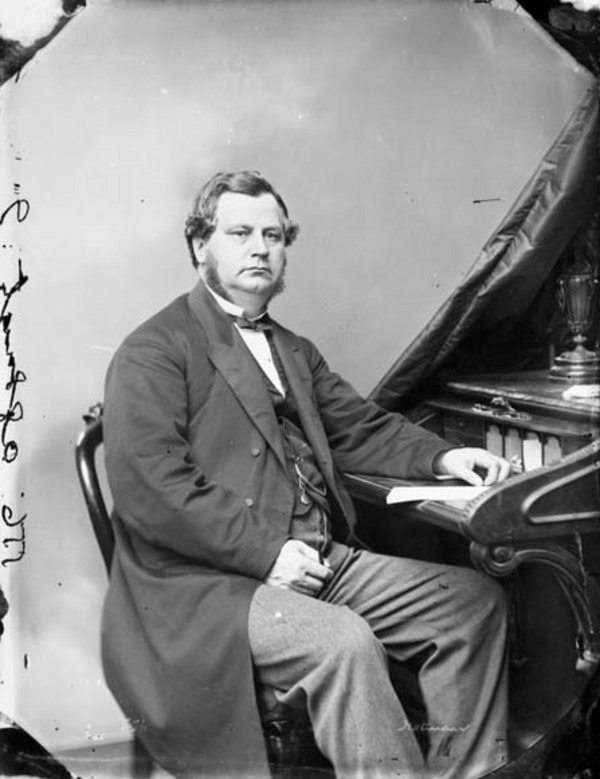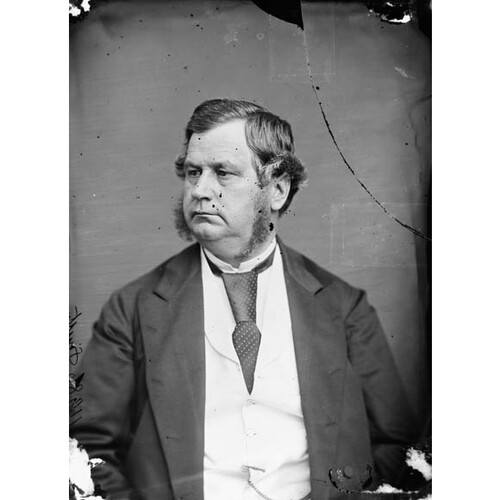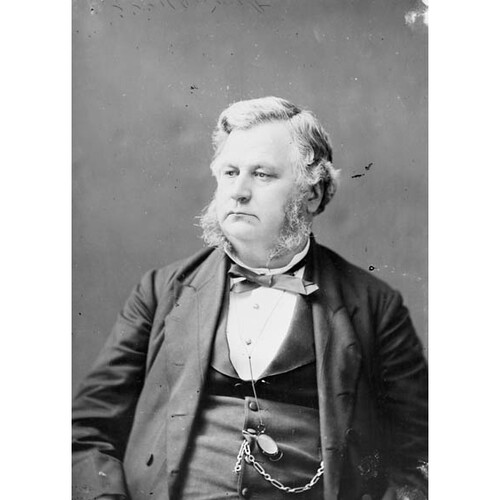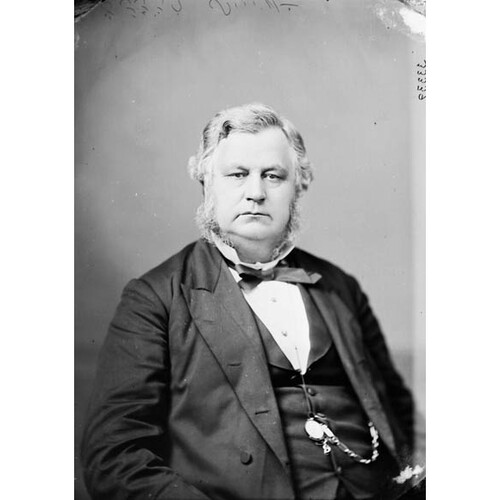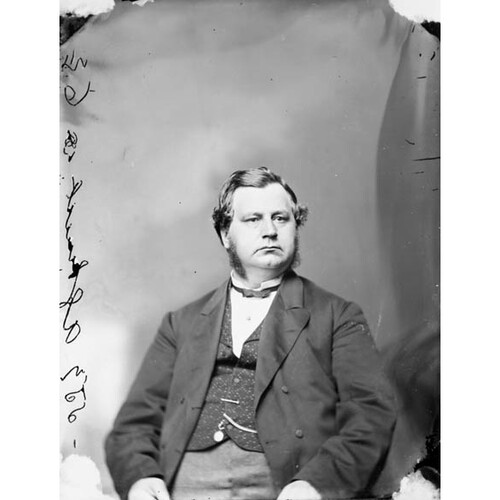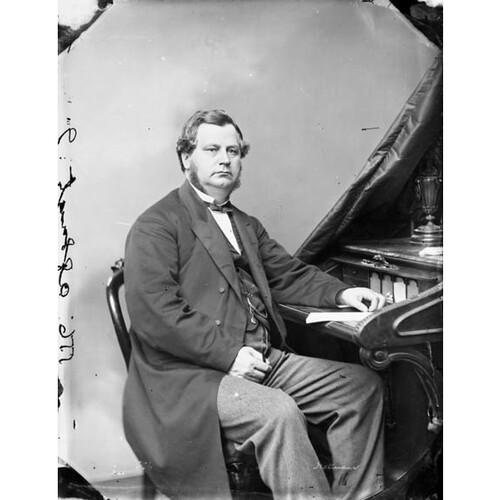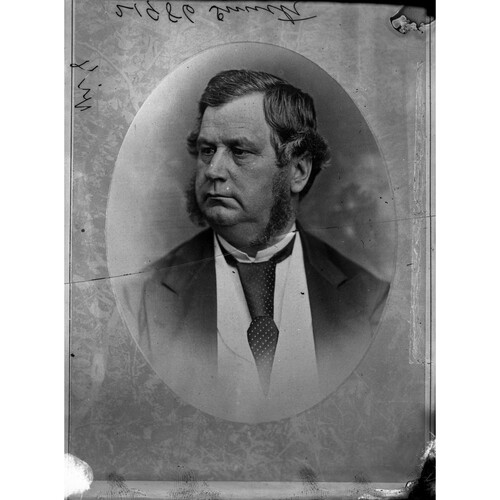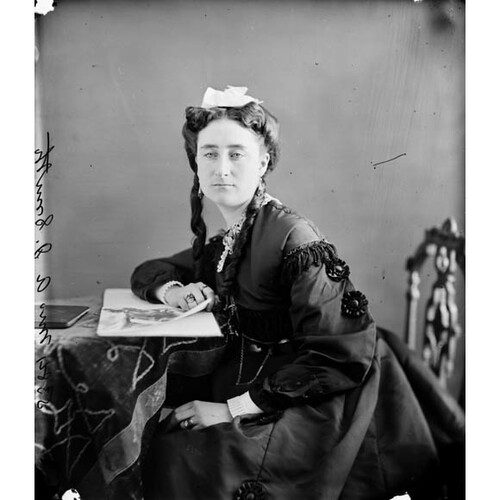SMITH, Sir ALBERT JAMES, lawyer and politician; b. 12 March 1822 in Shediac, N.B., son of Thomas Edward Smith and Rebecca Beckwith; m. 11 June 1868 Sarah Marie Young, and they had one son; d. 30 June 1883 at Dorchester, N.B .
Albert James Smith’s grandfather, Bowen Smith, was a Massachusetts loyalist who settled in Kingston, N.B., after the American revolution and moved to Shediac in 1807. His eldest son, Thomas, married a woman also of loyalist stock, and they had seven children. Operating a retail outlet in Shediac, Thomas Smith proved to be a shrewd entrepreneur specializing in the timber trade and merchandising. By the late 1830s he was prosperous enough to erect an impressive Georgian mansion for his family. Reared in relative comfort, Albert James Smith attended the Madras School of the Church of England and continued his education at the new Westmorland County Grammar School. After working for a year or two with his father in the store, he articled in the Dorchester law offices of Edward Barron Chandler*. At that time Chandler was the leader of the provincial “compact” government which dominated New Brunswick politics until 1854. Smith thus received an inside view of the political system while learning his profession. On 6 Feb. 1845 he was admitted as an attorney and on 4 Feb. 1847 was called to the bar. Intelligent and possessing a rapier tongue, Smith, “a tall man with black hair and black eyes,” had marked success with juries and soon had a lucrative practice, especially in the areas of commercial and marine law. Appointed district receiver of crown debts and a member of the provincial barristers society, he appeared to be headed for a distinguished and profitable legal career.
A vacancy for Westmorland County in the House of Assembly in 1852 changed his course. Ignoring the advice of relatives and friends by offering himself as an opponent to the Chandler “compact,” Smith issued his “political creed” before the by-election, identifying himself as a liberal who advocated such reforms as voting by ballot, biennial elections, an elected legislative council, strictly limited public spending, a reduced salary for the lieutenant governor, and the removal of the provincial capital from Fredericton, which was dominated by an “oligarchy . . . a few families.” Elected easily on 18 May, Smith attended the short fall session and supported the government-sponsored European and North American Railway to be built from Saint John to Shediac. Over the next couple of years Smith rose to the front rank of a growing opposition which condemned the government for wanting “to jog along as they were.”
What set Smith apart in the assembly was his vendetta against the privileges of the establishment. King’s College, Fredericton, an enclave for the “sons of the richest men in the Province,” became his favourite target. A “deep rooted prejudice,” Smith warned, “had taken possession of the minds of the people in the rural districts against this College which neither time nor exertion could overcome.” When Professor Joseph Marshall* d’Avray called Smith “Erostratus” for wanting to “burn down Diana’s temple,” Smith observed that d’Avray, recently “imported from England at the public expense,” might now, at public expense, be sent “to Russia, where he would find more congenial employment.” The forays against the institution led by Smith, most of them unsuccessful, became so animated in discussion that on one occasion, in 1856, the former attorney general, John Ambrose Street*, physically assaulted him in the assembly. Smith did, however, gather enough supporters to force an official inquiry which ultimately led to the transformation of the college into the University of New Brunswick in 1859 and reform under President William Brydone Jack.
The election of June 1854 resulted in a victory for the Reformers, and in November Smith became a member without portfolio of Charles Fisher*’s Executive Council. Others in the council were Samuel Leonard Tilley*, John Mercer Johnson*, James Brown*, William Henry Steeves*, and William Johnstone Ritchie*. It was a talented cabinet, “liberal to the back bone,” with Smith considered the radical demagogue of the group. He stood solidly with his colleagues by supporting such reforms as voting by ballot, an extended franchise, voter registration, the initiation of money grants by the Executive Council, the reorganization of government departments, and the diminution of the powers of the lieutenant governor; in addition, he backed the nationalization of the European and North American in 1856. Yet, though probably the most feared adversary in the assembly, Smith was primarily a lawyer-businessman who looked first to his practice and played a secondary role in government.
Smith’s talents on the stump and his independence within the government were illustrated during the debate over Tilley’s prohibitory liquor bill of 1855. He did not believe the bill could be enforced, but he was even more disturbed by “its arbitrary and coercive principle.” The legislation “was wrong – it was cruel,” and “he would rather see the whole Province sink in obscurity rather than oppose the power of liberty.” As soon as the act came into effect on 1 Jan. 1856, it proved inoperative and eventually led to the dismissal of the government by Lieutenant Governor John Henry Thomas Manners-Sutton* on 21 May. The “compact” rump, led by John Hamilton Gray, was invited by Manners-Sutton to form the government, an action which was supported in a June general election. Though Smith had opposed the act, he was even more incensed at what he considered the unconstitutional actions of the lieutenant governor and his compact. Smith relentlessly pounded Gray and his colleagues while they were in power and played an important role in their defeat in the election of 1857. According to the Saint John Morning News, Smith had been “at all times dignified, consistent, and straightforward . . . an unflinching advocate of popular rights.” The political establishment in the province was less enthusiastic about the aggressive activities of “Bully Albert Smith.”
The Fisher government was again in power, though Smith was still without portfolio, perhaps because he and Fisher were barely on speaking terms. Smith’s advocacy of change often took the form of opposition to the imperial influence, the governor, King’s College, or Fredericton as the capital; Fisher was both registrar of King’s College and a Fredericton stalwart. It was probably because they represented the diversity of the council that Fisher and Smith were sent to London together in 1858 as representatives to the ill-fated intercolonial conference on railways and British North American union. Over the next couple of years a Fisher–Smith feud almost immobilized the government, though Tilley kept it together until 1861, when Fisher was caught in a crown lands scandal and forced out of office. Tilley became the new premier with Smith as his chief lieutenant and attorney general from 27 April. Smith’s sharp tongue and equally sharp temper fuelled the high feelings in the assembly; on one occasion Lestock DesBrisay followed Smith into the speaker’s chamber, told him to stop “bullying” his opponents, and then “deliberately wrung his nose.” Smith went after DesBrisay with a fireplace iron but was restrained.
Such incidents did not hurt Smith or the government, for they were both returned in the election of June 1861 and appeared to have four years of tranquillity ahead of them, especially after Manners-Sutton’s departure in October. The fact that his replacement, Arthur Hamilton Gordon*, was a high-strung young aristocrat was ominous, however, and the American Civil War threatened to disrupt affairs in New Brunswick, especially if it led to increased public expenditures on the militia and the Intercolonial Railway, both of which Smith opposed. When Tilley departed for London on 30 October to participate in railway discussions, Smith was left in charge. Unfortunately, Gordon, whose opinion of colonial politicians rarely rose above disdain, did not like Smith. “I have had a little Brush with him but no blood spilt,” Smith informed Tilley after his first meeting with Gordon, but that was as friendly as the relationship ever became. Militia appointments led to an open split between the two. Gordon considered the appointments his prerogative, and he made them, according to Smith, “in violation to what we consider the rights of the people.” Smith insisted to Tilley that decisive action must be taken to protect “the dignity of our own position.” Gordon never appreciated this concern.
As attorney general, Smith was competent though he appeared to be uncomfortable in office. He preferred the privilege of decision-making rather than the responsibility. That his own legal practice also remained a first priority was revealed by the “Missaguash Affair,” in which he appeared to use the office of attorney general to introduce legislation that favoured his clients, upstream proprietors on the Missaguash River. The owners downstream, who had constructed an aboiteau (dike) on the river, immediately forwarded a petition calling for disallowance of the act to Gordon, who accepted it and, without legal advice or discussion with his attorney general, castigated Smith in a cold, formal letter. Though the act was never disallowed, the Duke of Newcastle, the colonial secretary, deprecated Smith’s actions in a style, according to the Saint John Morning News, “more arrogant and dictatorial [than Gordon’s], and in a spirit of greater unfairness.” Needless to say, Smith returned the favour in kind, on 9 Feb. 1863. “Your situation and mine are widely different,” he wrote in a public letter, addressed to Newcastle. “While you occupy a high Imperial position, I but fill an humble place in a small Province, in a remote part of the Empire. – Your voice and influence are powerful; mine are weak. Nevertheless my character and reputation are as dear to me, as yours are to you.” He then turned to the matter of responsibility. “I am responsible for my official conduct to the Legislature and people of the Province, and not to you. The correctness of this proposition you admit. . . . Why not leave me to deal with the parties to whom I am responsible, uninfluenced by the uncalled for expression of any opinion by you.”
By that time Smith was no longer a member of the government, having resigned on 10 Oct. 1862 because he disagreed with Tilley and the other members of the Executive Council who supported a significant provincial involvement in the Intercolonial Railway. Railways, in particular, Smith thought should be built by private funds. The increased taxation would lay a “heavy charge” which “our population and resources will not justify.”
He appears to have been relieved to be out of office. Created a qc in 1862, he was at the top of his profession. As a member of the assembly he remained on good terms with Tilley and did not gloat when the Canadians scuttled the Intercolonial in 1863. For Lieutenant Governor Gordon, however, there was nothing but contempt. In 1864 Smith learned that Gordon was demanding his salary in sterling rather than colonial pounds, which would have imposed an additional £600 levy on the provincial treasury. Tilley supported the governor’s position in the debate in the assembly; Smith opposed them both and on 29 May carried a majority in the house. On a popular issue, Smith had shown that he could be master of the assembly and that Tilley might be vulnerable. In the summer of 1864 another far more critical issue began to excite New Brunswickers. It was confederation.
Negotiations among the British Americans had matured into a full-blown British North American federation movement in 1864, with Tilley its New Brunswick apostle. Gordon had wanted a Maritime union, with himself as governor, but had lost the initiative. Smith was infuriated by the developments, and it was with an eye on Smith that Tilley constructed a coalition to carry the confederation project. Tilley recruited such former opponents as Chandler and Gray as well as discarded colleagues such as Fisher. The exclusion of Smith has never been fully explained. Perhaps he would not have joined. It is more likely that he was not invited because he was so completely opposed to any union scheme as well as to the Intercolonial Railway, which Tilley saw as the prize of negotiations. At any rate, by the time Tilley had returned from the ambulatory conference that had taken him to Charlottetown, Halifax, Quebec, Montreal, Ottawa, Toronto, and Niagara (Niagara-on-the-Lake), he encountered a hostile New Brunswick being given direction by Albert Smith, “The Douglas of Dorchester . . . the Lion of Westmorland.” Late in November 1864 Smith published a “Letter to the Electors of the County of Westmorland,” which was to become the force behind the anti-confederation blast in New Brunswick. The delegates to the conference, with a mandate to discuss only Maritime union, had acted unconstitutionally, he declared, and had placed the interests of Canada ahead of those of New Brunswick. The dominant Canadians would impose prohibitive taxes on the colony to pay for their past extravagances such as canals and railways. There would also be the cost of two governments rather than one and representation by population would place New Brunswick permanently in a subordinate position. When Tilley called an election early in 1865, Smith was ready for him. He stumped the province with a devastating speech in which he said that confederation had been conjured up in the “oily brains of Canadian politicians” as a solution to their own problems and as a scheme to exploit others. He warned his listeners to examine the two states, “one [Canada] suffering from anarchy and disquiet . . . [the other] New Brunswick . . . enjoying all the blessings of this life.” The spectre of direct taxation served as a backdrop to the designs of the Canadians, who would increase in dominance as their population and appetite grew, relegating New Brunswick to the status of a “mere municipality.” As an alternative Smith offered both continued reciprocity with the United States and the Western Extension Railway, part of the European and North American, from Saint John to the American border. But fear of Canada was the essential ingredient in his message. Smith presented his case with “great force and animation” and the anti-confederates in New Brunswick, with Smith the “heart and soul of the opposition,” shattered the union movement by carrying 26 of the 41 seats in the assembly. Four independents and 11 unionists were also elected.
After the anti-confederate victory Gordon had the mortifying task of inviting the despised Smith to form the government, though he tempered the chore by asking both Smith and Robert Duncan Wilmot*, a Conservative who opposed the Quebec plan, to select the Executive Council. Together they wrestled with the problem of choosing a cabinet from men united only in their opposition to the Quebec Resolutions. Some of the members of the cabinet they chose actually supported a British North American union with either a stronger central government or stronger provincial governments. John Campbell Allen* of Fredericton, the attorney general, was a Conservative like Wilmot and like him favoured a legislative union. Smith and George Luther Hatheway*, the chief commissioner of public works, wanted greatly increased provincial rights if any union scheme went forward, while Arthur Hill Gillmor*, the provincial secretary, and Timothy Warren Anglin* were opposed to all union schemes. Anglin, the leader of the Saint John Catholics, was considered an Irish radical and rebel by some and was especially difficult to work with because he refused to make any concessions or compromises. Since the Roman Catholic vote had been decisive in many constituencies where Smith’s supporters won, the Anglin and Catholic position could not be ignored. The general consensus on the cabinet was that it was a “queer admixture of Tories and Liberals” though Gordon admitted they were “men of undoubted honesty” and “an improvement on . . . the previous Council.” Smith, the president of the council, he described as “a man of some ability & considerable obstinacy. His views are narrow & his temper violent but though very impatient of opposition or control I believe him to possess the merits of honesty of purpose & resolution. He belongs to the radical section of politicians, but, at the same time, is very hostile towards the U.S.”
The mutual distrust that existed between Smith and Gordon was only one of a variety of problems. The members of the council disagreed on most issues and policies, from the militia and railways to external relations and the role of the lieutenant governor. A master manipulator might have manœuvered among them with dexterity; Smith seemed paralysed by the situation. Shortly after assuming office in March 1865, Smith was characterized by the Saint John Morning Telegraph as the “ablest and most eloquent apostle of the genus and generation stand-still,” a view proved unfair when the government introduced a new militia bill and a Western Extension Railway bill in the spring session of that year.
The determination of the British government to reverse the New Brunswick decision on confederation was Smith’s greatest concern, and for that reason he and Attorney General Allen left for London on 20 June 1865 to counteract imperial pressures. They also sought support for a renewed reciprocity treaty, for a railway link between New Brunswick and Nova Scotia, and for a loan of £25,000 sterling from Baring Brothers to meet provincial fiscal obligations. Though they were successful on the last three, Edward Cardwell, the colonial secretary, made it clear that he was committed to confederation. He may have offered Smith a position such as a colonial governorship to induce his support.
Smith returned to New Brunswick less confident than he had been on leaving it. His council was becoming restless and his policies were in jeopardy. The first sod was turned on the Western Extension Railway on 10 Nov. 1865 but because of financial difficulties construction never proceeded. Anglin, who was strongly committed to the railway, chose to resign from the cabinet. Vacancies on the bench led to the appointment of Allen to the Supreme Court and in a brutally fought by-election in York County Charles Fisher defeated Smith’s candidate, John Pickard. Another vacancy on the bench caused more dissension and the defection from the cabinet of Andrew Rainsford Wetmore*, whose claims had been ignored. The American rejection of reciprocity early in 1866 left Smith without a programme and prompted the resignation of Wilmot, who now openly supported confederation. In the mean time, Gordon, as a dutiful imperial servant under pressure, exerted all the force he dared to achieve a union policy. In February 1866 Smith was compelled to take a hard look at his position. His original council was fragmented beyond recognition and his promises of reciprocity and the Western Extension had proved empty. The independents in the assembly were drifting away and were joined by deserters such as Wilmot and Wetmore. Though Smith was convinced he still had the support of the assembly and the province, he was also aware of his mounting failures and the increase in the pro-union sentiment. Gordon continuously pressed Smith to pursue a union policy that would be acceptable to the imperial authorities, the Canadians, and the majority of New Brunswickers. From late 1865 Smith probably realized he would have to follow such a course, but he vacillated for weeks before deciding to include a vague paragraph in the speech from the throne on 8 March 1866 suggesting that his government would advocate some form of British North American union.
Whether Smith had a plan in mind is not known. It may have been no more than a notion to pursue some form of union. Opponents both within and outside his party never let him work out his ideas. Internally, the Acadian and Roman Catholic members would not support any union legislation. Externally, Charles Fisher and the confederates were determined that Smith should not carry confederation and claim the anticipated rewards. To that end they fought him in the assembly with a debate on an amendment to the speech from the throne, accusing him of failing to take adequate steps to protect the province from the threatened Fenian invasion. For four long weeks the debate dragged on and the government was paralysed. Gordon, convinced that his future in the colonial service depended upon his colony pursuing a union path, became alarmed as Smith appeared to abandon any move towards confederation. By the beginning of April Gordon could no longer tolerate the situation. He decided to force Smith from office by accepting a strongly worded pro-confederation reply to the speech from the throne from the upper house, the Legislative Council. In a colony with responsible government this was a highly irregular procedure for a governor to follow. Smith correctly insisted that it was his right to be consulted and to recommend, but Gordon cared little about the rights and dignity of colonials. Smith resigned. It was his only course. It was also a constitutional crisis of the first order and one that Tilley considered unnecessary since he was convinced Smith would have had to capitulate within a few weeks. Still, the confederates took office when it was offered to them by Gordon and immediately went to the electorate for approval.
Smith could not carry New Brunswick in the elections of May and June 1866. Those ideas and proposals that served so well in 1865 had proved a sham. There was no Western Extension, no reciprocity, no good government. Smith’s opposition to union was also questionable. He dwelt on the detestable lieutenant governor, but Gordon’s term was up and few seemed to care. The confederation party, with imperial backing, Canadian money, and good luck, including a Fenian invasion during the election, was not to be denied. Even the Roman Catholic bishops supported it in 1866. New Brunswickers were promised sound government, lower taxes, greater wealth, and more control over the new government. The confederates succeeded in associating Smith with the anti-confederates, the annexationists, and the Fenians. They implied there was a French and Roman Catholic conspiracy against Protestantism and the empire, with Smith its unwitting tool. Smith faced this shameful assault valiantly. He “felt proud of the French population of this country; they would compare favourably in every respect with the English population; they were incorruptible and could not be bought!!!” When the election was over Smith and his group of 8 faced 33 pro-confederates in the assembly. A pattern had been set for New Brunswick politics which would persist, the mainly Roman Catholic and Acadian bloc on one side and the predominantly Protestant and English-speaking bloc on the other.
The assembly was called together in June 1866 to pass a confederation resolution and Smith tried for a final time to head off the Quebec scheme. He called for a public referendum on any act of confederation, equal representation for provinces in the upper house, a limited number of members of parliament, a guarantee of a cabinet minister for each Maritime province, the establishment of a court to settle federal–provincial disputes, and strict control over taxation. His motions were rejected 26 to 8 and the “Fathers” were soon off to London, England, and the British North America Act. It was a thoroughly chastened Smith who was elected to the House of Commons for Westmorland in August 1867.
Like Joseph Howe* of Nova Scotia, that other notable anti-confederate from the Maritimes, Smith was watched with apprehension at Ottawa. Unlike Howe, who demanded the repeal of the British North America Act, Smith assured the House of Commons that “he had fought against Confederation, was conquered and laid down his arms, and was anxious to assist in working out the measure.” That certainly did not mean he would accept whatever the government of Sir John A. Macdonald* proposed. He remained a determined provincial rights man to the end. He never overcame his distrust of the Canadians, a suspicion confirmed by the actions of the House of Commons in its first months. The new tariff structure, with its levy on such items as flour, sugar, tea, and molasses, was exactly what he had predicted. On 31 Dec. 1867 he delivered a speech in Saint John to a packed hall in which he concluded sadly: “We are utterly powerless. We are under the controlling power of Messrs. McDonald and [George-Étienne Cartier*] . . . though there should be a change of Government, it would be no better for the people of the Maritime Provinces. The interests of Ontario were entirely distinct and at variance with all the other provinces.”
During those early years at Ottawa Smith served as a totally independent member, wary of the old Canadians in all they did but finding the Liberals even more Ontario-centred and provincial than the Liberal-Conservatives. The alienation of the Maritime members was fed by the tariff increases, the purchase of Rupert’s Land, the delay in the construction of the Intercolonial Railway, and the overwhelming dominance of the central Canadians in both the cabinet and the federal civil service. To make matters worse, opposition in the traditional sense was drowned by cries from the government benches as well as from the opposition side. When Smith, for example, called in 1870 for the “British Government to confer on us the power of looking after our commercial interests,” he was charged with disloyalty and his proposal was dismissed. By that year the dissatisfaction with Ottawa had become so widespread in New Brunswick that all candidates in the provincial election in July condemned federal policies. Had Smith chosen to, he might have led a strong repeal, independence, or annexationist movement, especially after the disaster of the Treaty of Washington in 1871 by which the inshore fisheries of the Maritime provinces were opened to American fishermen without a quid pro quo such as the reciprocity urgently sought by Maritimers. Smith refused to give encouragement to the discontents, however, and remarked that “there had scarcely ever been a treaty between England and the United States in which the latter had not the best of it.” For lack of an alternative, he supported the treaty. Most New Brunswick members followed him.
By 1872 Smith was regarded as the unofficial leader of the New Brunswick contingent in the House of Commons, generally giving his support to the Liberal-Conservatives. Up to that time Tilley had proved ineffectual in the cabinet and he was treated with some hostility both in and out of parliament. Paradoxically, Smith had become his major ally in the commons in defence of the interests of their province. The assault in 1872 by John Costigan* and some Quebec members on the New Brunswick Common Schools Act of the previous year, which deprived the Catholic population of public funding for their separate schools, saw Smith and Tilley working together to defend the position of the New Brunswick government. In the election of that year Smith publicly announced his “dissolution of partnership with the Grits” and his support for Macdonald’s Liberal-Conservatives, who swept the province. The next year Smith was offered the lieutenant governorship of New Brunswick by an appreciative Macdonald, but he preferred to stay in the House of Commons. He was, also, not prepared to give up his legal practice. Within two months, however, Smith stood against Macdonald and with the Liberals. On 13 Aug. 1873 Macdonald, faced with the Pacific Scandal, adjourned the House of Commons in “an act of tyranny” the purpose of which, according to Smith, was to deprive parliament of its rights. On 6 November Macdonald resigned as prime minister to be replaced by Alexander Mackenzie* and the Liberals.
That Smith would join Mackenzie’s cabinet no one doubted. Six years after confederation his role as the archetypal anti-confederate was forgotten. The Saint John Daily Telegraph described him as an “able lawyer . . . shipowner and capitalist” who was “in every way a man of mark” and was “personally popular.” He became minister of marine and fisheries and carried 12 New Brunswick Liberals back to Ottawa in the election of January 1874. Tilley had accepted the lieutenant governorship of New Brunswick in the last hours of the Macdonald government, leaving Smith the unchallenged New Brunswick champion in Ottawa. Smith, in fact, came to the defence of Tilley when some Liberals attempted to undo his last-minute appointment, and in January 1874 went out of his way to praise his former colleague in a public testimonial.
The next four years were to be among the most rewarding in Smith’s life. He had ended his apparently frisky bachelorhood on 11 June 1868 when he married 21-year-old Sarah Marie, the daughter of John Wilson Young, a prosperous Halifax capitalist. He built a spacious red-brick mansion called Woodlands at Dorchester, where their son, John Wilson Young Smith, grew up. In Ottawa, Smith was at the centre of affairs, with Mackenzie relying on him as the Maritime expert and confiding in him on many matters. When the ministry of justice became vacant in 1874, it was offered to Smith, probably on Edward Blake*’s recommendation, but was not accepted. Smith had participated that year in the doomed negotiations with the United States over reciprocity. He was, however, most comfortable as minister of marine and fisheries, an office which was of central importance to New Brunswick, and to which he was well suited as one of the “ablest marine lawyers” in Canada. He knew the law of the sea, international shipping and insurance, marketing, and negotiating. The ministry was to give Smith his greatest single triumph. The Americans were required to pay a financial compensation for the right to the east coast fishery by the Treaty of Washington, the amount to be settled by arbitration. Halifax was selected as the location for the necessary meetings, which began on 15 June 1877. Sir Alexander Tilloch Galt*, a Canadian, was the British representative, Ensign H. Kellogg was the American, and Maurice Delfoss of Belgium was the neutral arbitrator. Smith and his staff had spent years on their brief and at Halifax convinced Galt and Delfoss of the justice of the Canadian claim. On 23 November of that year the commission decided by a vote of two to one that the value of the fisheries for a 12-year period, 1871–83, be set at $5,500,000. Canada received $4,500,000 of which $500,000 was used to cover costs. The interest on the $4,000,000 was eventually designated for needs of the east coast fishery. Newfoundland got the other $1,000,000. The Halifax award was a monumental victory for Canada, if only because the United States had not won. Smith, “the ruling spirit throughout,” was lionized: the Canadian Illustrated News (Montreal) featured him on its cover; and the Halifax Herald commented that “his attention to the case, his labor in aiding its conduct, and his anxiety to bring about a favorable result for Canada, do him a credit which has hitherto been refused.” The British authorities concurred and on 25 May 1878 he was created a kcmg. Only a dozen others had been so honoured since confederation and he was the first native-born New Brunswicker to be knighted. The irony of Smith’s triumph was not lost on those who remembered his role in the struggle over confederation, especially Peter Mitchell*, who had replaced Smith as president of the New Brunswick Executive Council in 1866 and had been Canada’s first federal minister of marine and fisheries. He denigrated Smith in that office throughout Smith’s term and made boorish claims that the Halifax award was the result of his own efforts before Smith had taken over in 1873.
In the federal election of 1878 the Macdonald Conservatives were returned to power on the platform of the National Policy as a solution to the depression that had plagued the Liberals throughout their years in office. Across New Brunswick, however, Smith’s popularity helped to take 11 of the 16 seats. “No man in the Province can beat AJ Smith,” wrote an observer. “I consider it only folly for any one to try.” The completion of the Intercolonial Railway in 1876, the reconstruction of Saint John after the fire of 1877, and the erection of such government works as the federal penitentiary at Dorchester had all helped to alleviate the gloom of the depression in New Brunswick.
Over the next four years Smith served adequately, leading the opposition attack on occasion, but the spunk that had vivified his earlier years was missing. He had recently become quite portly, and he became known to critics as “Sir Albert the Lazy.” Mackenzie had complained of the general lack of vitality in his cabinet while in office, and had referred to Smith, who “could be an efficient Minister if he took the trouble,” as “fat and easy” and “lazy.” By the time the 1882 election arrived Smith was vulnerable for the first time in his career. The Conservatives nominated Josiah Wood*, a talented young lawyer from Sackville, to run against him. It was a hard campaign, with the Moncton Times providing a focus for the opposition. “VOTE against the sectional Ontario Party,” it urged. “WESTMORLAND CANNOT LONGER AFFORD TO BE MISREPRESENTED BY SIR ALBERT SMITH.” This cry rang true to many of the newcomers who had recently moved to the county and could not identify with the honourable elder statesman and his past. After 30 years in politics Smith was finally defeated. “The power of the One Man Party is broken,” crowed the Times, “the dictation of the Dorchester Corner Clique is at an end.”
Smith reacted to his defeat at first with bitterness and then with bewilderment. He had come to think of the seat as his by right. Cut off from political life he lost his bearings. Even his health, which had been good until the election, began to deteriorate. By the spring of 1883 he was wasting away and he died on 30 June, leaving an estate in excess of $100,000.
Smith was not a great leader, nor did he initiate any major changes. There was always something of the village conservative in him even when he expressed his liberal views. True, he was anti-establishment, but it was old establishment, not the new of which he was a member. He was honest, sincere, and more consistent than most politicians, for he did not use politics to accumulate judgeships or governorships, all of which he refused. Ultimately, his opposition to confederation was the major event of Smith’s career, though the victory over the Americans at Halifax was no mean achievement. As fashions in history change and as the nature of confederation is critically re-examined, Smith the dissenter can no longer be disregarded as a negative, narrow-minded, Maritime parochialist. He was not a statesman, but he was a discerning politician.
[Smith’s 30 years in politics had been exceptional, marked by both honours and controversy, yet he has been almost totally banished from the history books. He left no papers to guarantee a niche for himself (they were destroyed after his death), nor did his wife and son wish to have their privacy invaded by a biography. That still does not account for the lack of interest in Smith. Of course he was from a fringe region and opposed confederation, two contingencies that go far to explain the indifference among the centralist-oriented historians who have dominated the writing on Canada’s past. His knighthood and his role at the fisheries commission ordinarily should have attracted some curiosity, but it is Galt who is remembered, with little apparent justice. Smith also had the misfortune to be a member of the Mackenzie cabinet, which was unable to cope with the enormity of the depression of the 1870s and has been tarred with ineptitude. In New Brunswick history, Smith fares just as poorly. The earlier historians such as James Hannay* were intolerant of the opponents of confederation. More recently, much of New Brunswick history has been written from the imperial perspective, as garnered from the papers in the Colonial Office and such lieutenant governors as Manners-Sutton and Gordon. Not surprisingly Smith and most other colonial politicians who lacked the proper deference come off badly and are relegated to minor roles in a story about imperial officials. The New Brunswick sources, however, suggest quite a different interpretation.
The first modern study was C. M. Wallace, “The life and times of Sir Albert James Smith” (ma thesis, Univ. of New Brunswick, Fredericton, 1960), which was reworked as “Albert Smith, confederation, and reaction in New Brunswick, 1852–1882,” CHR, 44 (1963): 285–312. J. E. Belliveau, The splendid life of Albert Smith and the women he left behind (Windsor, N.S., 1976), and “Sir Albert Smith, the Acadians and New Brunswick politics, 1852–1883,” Soc. hist. acadienne, Cahiers (Moncton, N.-B.), 8 (1977): 65–79, have appeared but are marked by faulty research.
Hannay, Hist. of N.B., II, is still useful, but the pre-confederation section is inadequate. Of considerable use are the following: J. K. Chapman, The career of Arthur Hamilton Gordon, first Lord Stanmore, 1829–1912 (Toronto, 1964); MacNutt, New Brunswick; Waite, Canada, 1874–96, and Life and times of confederation; C. M. Wallace, “Sir Leonard Tilley: a political biography” (phd thesis, Univ. of Alberta, Edmonton, 1972); A. G. Bailey, “The basis and persistence of opposition to confederation in New Brunswick,” CHR, 23 (1942): 374–97; and T. A. Burke, “Mackenzie and his cabinet, 1873–1878,” CHR, 41 (1960): 128–48. There is also useful material in the following primary sources and biographical works. c.m.w.]
N.B. Museum, James Brown, Journal, 1844–70; E. B. Chandler papers; Jarvis family papers; Tilley family papers; Webster coll. PAC, MG 24, B29; MG 26, A; B; MG 27, I, D15. PANB, RG 2, RS6, 1854–67; Arthur Hill Gillmor papers. PRO, CO 188; CO 189. UNBL, MG H12a. Can., House of Commons, Debates, 1867–70, 1875–82. N.B., House of Assembly, Journal, 1852–67; Reports of the debates, 1852–57. “Parl. debates” (CLA mfm. project of parl. debates, 1846–74), 1873–74. Parliamentary debates, Dominion of Canada . . . (3v., Ottawa, 1870–72). Chignecto Post (Sackville, N.B.), 1877. Daily Telegraph (Saint John, N.B.), 1869–83. Moncton Times, 1877–83. Morning Freeman (Saint John), 1860–72. Morning News (Saint John), 1852–84. Morning Telegraph (Saint John), 1864–69. Saint John Globe, 1858–73. Canadian biog. dict., II. CPC, 1862–82. Dominion annual register, 1883. M. O. Hammond, Confederation and its leaders (Toronto, 1917).
Cite This Article
C. M. Wallace, “SMITH, Sir ALBERT JAMES,” in Dictionary of Canadian Biography, vol. 11, University of Toronto/Université Laval, 2003–, accessed February 21, 2026, https://www.biographi.ca/en/bio/smith_albert_james_11E.html.
The citation above shows the format for footnotes and endnotes according to the Chicago manual of style (16th edition). Information to be used in other citation formats:
| Permalink: | https://www.biographi.ca/en/bio/smith_albert_james_11E.html |
| Author of Article: | C. M. Wallace |
| Title of Article: | SMITH, Sir ALBERT JAMES |
| Publication Name: | Dictionary of Canadian Biography, vol. 11 |
| Publisher: | University of Toronto/Université Laval |
| Year of publication: | 1982 |
| Year of revision: | 1982 |
| Access Date: | February 21, 2026 |


